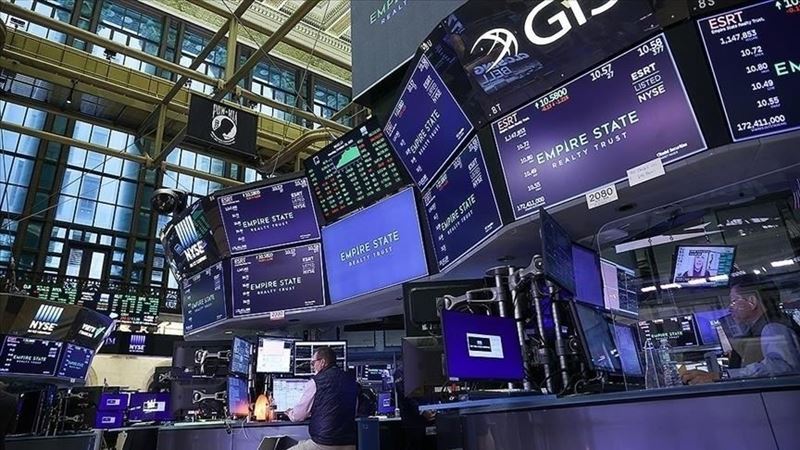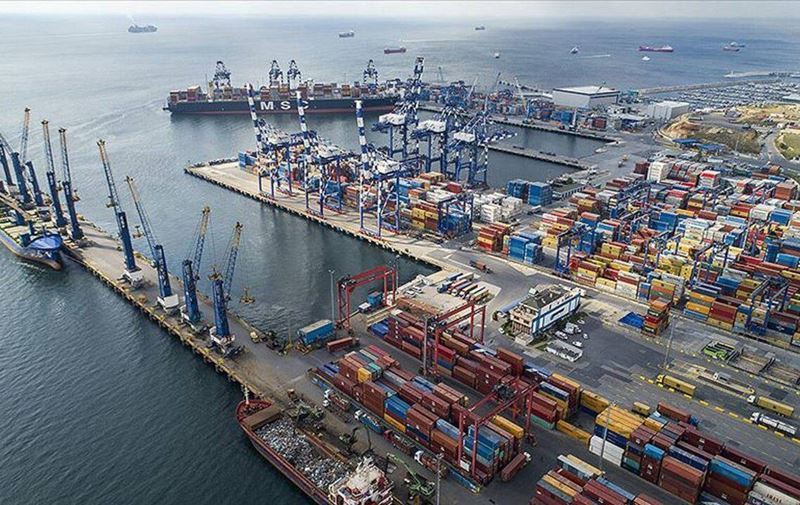Global share markets closed the week positively with strengthening expectations that central banks around the world will end interest rate hikes soon, while the intense data agenda for next week, especially inflation in Europe and the US Central Bank's (Fed) "Beige Book" report, has settled into the focus of investors.
While uncertainties regarding the Fed's monetary policy were influential on asset prices throughout the week, although the inflation data announced in the country relatively relieved investors, the statements made by Fed members on the last trading day of the week increased the volatility in the markets.
Although the increase in the Consumer Price Index (CPI) in the country decreased from 6 percent to 5 percent on an annual basis, leaving behind expectations, the increase in the core CPI from 5.5 percent to 5.6 created question marks. The fact that the annual rate of increase in the Producer Price Index (PPI) decreased to 2.7 percent, well below the expectations, increased the risk appetite.
It is expected to increase interest rates by 25 basis points with 78 probability.
On Friday, Fed members emphasized in their statements that the uncertainty about whether the Bank will end interest rate hikes in the near future, causing fluctuations in asset prices, while it is predicted that the Bank will increase interest rates by 25 basis points with a 78 percent probability in the next meeting in money markets.
On the other hand, the Fed minutes released last week revealed that keeping the interest rate constant was evaluated at the March meeting, but the latest decision was to increase by 25 basis points. In the minutes, it was reported that Fed officials forecast a mild recession at the end of the year, given the potential effects of the latest developments in the banking sector.
With the aforementioned developments, the 10-year bond yield of the US closed the previous week at 3.52 percent with an increase of approximately 11.5 basis points.
10 months later, it was over 30 thousand dollars again
The dollar index, which carried its downward trend for the fifth week in a row, closed the week at 101.6, 0.5 percent below its previous closing, after testing the lowest level of the last year at 100.8 yesterday.
The ounce price of gold, which increased to the highest level since March 9, 2022 with $ 2,048.7 during the week, closed the week at $ 2,004.2 with a decrease of 0.2 percent compared to the previous closing with the effect of the hard sales yesterday. The price of Bitcoin, the largest cryptocurrency, has increased to over 30 thousand dollars again 10 months later.
The barrel price of Brent oil increased by 1.7 percent last week, completing the week at $ 86.1, carrying the upward trend for the fourth week in a row.
New York stock markets followed a buying-heavy course
While the US stock markets followed a positive course last week, the signals from the Fed's "Beige Book" report on Monday, as well as the leading Purchasing Managers Index (PMI) data to be announced on Friday, will be in the focus of investors.
Analysts stated that uncertainties about whether the Fed will end interest rate hikes in the near future and said that markets may seek direction again.
In the US, JPMorgan Chase, Citigroup and Wells Fargo's net profit increased in the first quarter of this year despite the difficulties in the banking sector, analysts said, adding that the bankruptcy of two medium-sized banks in the US last month raised concerns about a potential recession, but the resilient earnings of the country's large banks eased concerns that there would be more stress in the sector.
Global economic growth forecast
On the other hand, World Bank Group President David Malpass announced that the global economic growth forecast was revised from 1.7 percent to 2 percent for this year.
According to data released this week, the number of first-time applications for unemployment benefits in the US increased to 239 thousand in the week ending April 8, exceeding expectations.
The Dow Jones index increased 1.2 percent.
Data released in the US continues to give mixed signals. While retail sales decreased 2.94 percent y-o-y in March, below expectations, industrial production exceeded expectations with an annual increase of 0.53 percent in the same period.
Capacity utilization rate was 79.8 percent in March. The University of Michigan confidence index was also announced in April with 63.5, above the projections.
With these developments, the S&P 500 increased 0.8 percent, the Nasdaq index increased 0.3 percent and the Dow Jones index increased 1.2 percent in the New York stock market last week.
In the data calendar for the week starting April 17, the New York Fed manufacturing index on Monday, building permits and housing starts on Tuesday, the Fed's "Beige Book" report on Wednesday, the Philadelphia Fed Manufacturing Index on Thursday, current home sales and weekly jobless claims, Leading PMI data will be followed on Friday.
In Europe, eyes are turned to inflation data
While the decrease in inflation in European countries, albeit at different speeds, and the loss of strength of expectations that the European Central Bank (ECB) will continue its "ultra-hawkish" steps support risk appetite, inflation data to be announced in the Eurozone on Wednesday next week has settled on the focus of investors.
While the predictions that the ECB will increase rates by a total of 75 basis points by September and end the rate hike cycle have strengthened, it is estimated that uncertainties about the size of the steps to be taken may continue for some time.
It pointed out that the economic activity remains strong
According to data released during the week, retail sales in the Eurozone decreased less than forecasts with an annual decrease of 3 percent, while industrial production exceeded expectations with an annual increase of 2 percent, indicating that economic activity remains strong.
While the British economy did not grow in February due to the impact of strikes on economic activities, industrial production in the country decreased below the forecasts with a monthly decrease of 0.2 percent in February. In Germany, the increase in CPI was 7.4 percent annually and 0.8 percent monthly in March, in line with the expectations.
It also carried its uptrend for the seventh week in a row.
On the other hand, the euro/dollar parity amounted to the level of 1.1077 yesterday and tested the peak of the last year. The pair completed the week with an increase of 0.8 percent at 1.0990 and carried its upward trend for the seventh week in a row.
With these developments, the CAC 40 index in France increased by 2.7 percent to its highest closing of all time, while the DAX index in Germany increased by 1.3 percent, reaching its highest level since January 2022. In the UK, the FTSE 100 index gained 1.7 percent and the MIB 30 index in Italy gained 2.4 percent.
Next week, unemployment in England, Eurozone and ZEW indices in Germany, CPI and PPI in England and Eurozone on Wednesday, PPI in Germany on Thursday, foreign trade deficit and economic confidence index in Eurozone, Friday Retail sales in the UK and leading PMI data across Europe will follow.
Warren Buffet effect on Japanese markets
While a positive trend stood out in Asian stock markets last week, the central banks of the countries in the region, which announced their interest rate decisions, kept the interest rates constant.
While the Central Bank of Singapore did not change its policy rate during the week, it was stated in the statement made by the bank that further tightening could hurt economic activity. The South Korean Central Bank also kept the policy rate unchanged at 3.50 percent, in line with expectations.
On the other hand, in the statement made by the People's Bank of China (PBoC), it was announced that Chairman Yi Gang and Fed Chairman Jerome Powell had a face-to-face meeting for the first time since 2022. Imports, on the other hand, decreased by 1.4 percent. Thus, foreign trade surplus was 88.2 billion dollars in March.
He said he raised concerns about the Chinese economy.
In China, CPI increased by 0.7 percent annually in March, while PPI decreased by 2.5 percent. Analysts stated that especially the decline in PPI indicated a decrease in global demand and increased concerns about the Chinese economy.
Kazuo Ueda, who was appointed as the Chairman of the Bank of Japan (BoJ) last week, stated at his first international meeting that they did not foresee a global recession and that wage increases in Japan could continue.
Although the increase in PPI in Japan decreased to 7.2 percent in March, it was above expectations, while core machinery orders exceeded expectations with an annual increase of 9.8 percent.
The Nikkei 225 index in Japan gained 3.54 percent on a weekly basis, with the effect of these developments and the famous investor Warren Buffet's announcement that he invested in Japanese companies and that he would increase these investments.
Foreign trade deficit data to be followed in Japan on Thursday
In China, the Shanghai composite index increased by 0.32 percent from July, while the Kospi index in South Korea increased by 3.26 percent, the highest weekly close since June. Hang Seng index in Hong Kong also finished the week with a premium of 0.53 percent.
In the data calendar of the week that started with April 17, Chinese economy growth, industrial production and retail sales on Tuesday, capacity utilization rate and industrial production in Japan on Wednesday, and foreign trade deficit data in Japan on Thursday will be followed.
Before the holiday, the intense data agenda will be followed in the country.
Domestically, while the BIST 100 index closed at 5,092.88 points with an increase of 3.42 percent last week, the eyes of the Central Bank of the Republic of Turkey (CBRT) Market Participants Survey and consumer confidence index were turned to the intense data agenda in the next week.
During the week, the CBRT decided that Turkish lira-settled forward foreign exchange selling auctions could be held directly with banks willing to trade.
This week, the Capital Markets Board (CMB) approved the public offering application of CW Enerji Mühendislik Ticaret ve Sanayi AŞ for 108.60 TL and Graınturk Tarım AŞ for 17.60 TL.
It decreased by 6 percent monthly and 8.2 percent annually in February.
According to the domestic data released last week, Turkey's current account deficit amounted to 8 billion 783 million dollars in February, while a surplus of 834 million dollars was formed in the current account, excluding gold and energy. Industrial production, on the other hand, decreased by 6 percent monthly and 8.2 percent annually in February, when the earthquake disaster took place.
On the other hand, the short-term external debt stock increased by 3.1 percent in February compared to the end of 2022 and reached 153.1 billion dollars.
Dollar/TL closed the week at 19.3626, 0.6 percent above the previous weekly closing.
Overseas PPI data will be followed
Analysts said that technically, 5,000 and 4,900 levels in the BIST 100 index could stand out as support, and 5,150 and 5,200 points as resistance.
The international investment position and the central government budget balance on Monday, the house price index on Tuesday, the international reserves and foreign exchange liquidity and the CBRT Market Participants Survey and the consumer confidence index on Wednesday, the weekly monetary and bank statistics as well as the PPI data on Thursday will be followed in the country next week.
Domestic markets will be closed on Thursday afternoon and Friday full day due to the Eid al-Fitr holiday.









Comments
No comment yet.